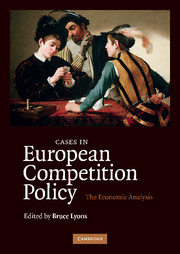Book contents
- Frontmatter
- Contents
- Contents by potentially anticompetitive business practices
- Contents by markets
- List of figures
- List of tables
- List of contributors
- Preface
- Introduction: the transformation of competition policy in Europe
- A Anticompetitive behaviour by firms with market power
- B Agreements between firms
- C Mergers
- Introduction
- C.1 Measurement of unilateral effects
- 12 A merger in the insurance industry: much easier to measure unilateral effects than expected
- 13 Merger simulations of unilateral effects: what can we learn from the UK brewing industry?
- C.2 Coordinated effects
- C.3 Vertical and conglomerate effects
- Bibliography
- Index
13 - Merger simulations of unilateral effects: what can we learn from the UK brewing industry?
Published online by Cambridge University Press: 05 June 2012
- Frontmatter
- Contents
- Contents by potentially anticompetitive business practices
- Contents by markets
- List of figures
- List of tables
- List of contributors
- Preface
- Introduction: the transformation of competition policy in Europe
- A Anticompetitive behaviour by firms with market power
- B Agreements between firms
- C Mergers
- Introduction
- C.1 Measurement of unilateral effects
- 12 A merger in the insurance industry: much easier to measure unilateral effects than expected
- 13 Merger simulations of unilateral effects: what can we learn from the UK brewing industry?
- C.2 Coordinated effects
- C.3 Vertical and conglomerate effects
- Bibliography
- Index
Summary
Introduction
Unlike most of the chapters in this book, this one is not concerned with a specific case. Instead it is methodological. In particular, I discuss the use of simulation techniques to evaluate unilateral effects of horizontal mergers, bearing in mind the trade-off that exists between simple and complex models. On the one hand, a simple model can be implemented in a short period of time and it can be understood by non-experts. On the other hand, the conclusions concerning merger effects that can be drawn from a simple model can be very misleading. One is therefore often faced with the choice between implementability and accuracy. In this chapter, I assess the implications of that choice.
Due to the trade-off between simplicity and accuracy, it is unlikely that merger simulations will ever replace more traditional analysis, such as an examination of the extent and structure of the market and the merging firms' shares of that market. Instead, the two sorts of analysis should be complementary and, if the limitations of simulation techniques are understood, they can be useful supplements. It is a mistake, however, to oversell their potential or their precision.
The use of simulations is illustrated with an application to mergers in the UK brewing industry, which is an important market that has received much attention from competition authorities.
- Type
- Chapter
- Information
- Cases in European Competition PolicyThe Economic Analysis, pp. 312 - 346Publisher: Cambridge University PressPrint publication year: 2009
- 8
- Cited by



